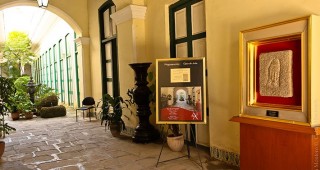
Hotel Telégrafo LH  2+
2+
Initially located on Amistad Street and relocated in 1899 to its present site, the Telégrafo Hotel was rebuilt in 1911 and was considered then one of the most modern hotels in Havana. In 2001 it was r …
 $48 - $69ROOMS: 63Prado No. 408 esquina a Neptuno
$48 - $69ROOMS: 63Prado No. 408 esquina a Neptuno 
Casa de Asia LH  2
2
Opened in 1997, this small museum—upstairs in a townhouse mansion built in 1688—displays collections that depict the lifestyle, dress, religious beliefs, rituals and traditions from different Asiatic …

Banco de La Habana LH  2
2
This 1915 two-story building was made of reinforced concrete. Its façade was composed of elements of the Ionic order and stood out because of its semicircular portico and its beautiful wooden door, wh …
 EclecticAdmission: FreeCuba e/ Obispo y Obrapía, Habana Vieja
EclecticAdmission: FreeCuba e/ Obispo y Obrapía, Habana Vieja 
Parque de la Fraternidad LH  2
2
By 1790, this originally mangrove swampy area became Campo de Marte, a military practice range, which was expanded in 1793 thanks to a project by Belgian engineer Agustin Cramer. And after Bishop Espa …

Parque de los Mártires Universitarios LH  2
2
This cement park was built in 1967 to honor university students involved in Cuba’s independence struggles. The most notable element, located by the most important entrance, can be interpreted a fist, …

Cárcel de la Habana LH  2
2
Up until 1834 there were no prisons in Havana. Back then, prisoners were crammed together in a small area on the Palacio de Gobierno’s basement. With this in mind, Lieutenant General Miguel Tacón, Gov …

Museo Farmacia Taquechel LH  2
2
This townhouse was adapted in 1898 into a pharmacy by Francisco Taquechel. Restored and reopened in 1996, it functions as pharmacy and museum. Its collection includes 19th-century French porcelain apo …

Apartment building LH  1
1
Constructed on piles–a solution that is essentially in the style of Le Corbusier, which apart from transmitting a sort of lightness to the building, makes the corner lose its traditional compactness; …
 Modern23 y 26
Modern23 y 26 
Unión Árabe de Cuba LH  1
1
This is the venue of the Unión Árabe de Cuba, which represents around 50,000 Arab descendants from all over the country. It has a small art gallery which features Arab-influenced art and ceramics.

Solimar Building LH  1
1
An interesting and typical example of the Streamline movement which preferred rounded corners and a sensation of motion can be seen in this building built in 1944. The recovery of simple forms and the …
 Art DecoSoledad esquina a San Lázaro
Art DecoSoledad esquina a San Lázaro 